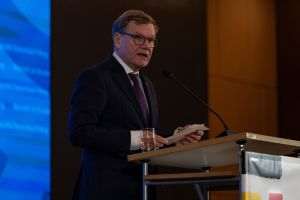Goldman Sachs? Not at all! The world is ruled by HNWIs!
MAKE (Translated by Cosmin Ghidoveanu)
Ziarul BURSA #English Section / 4 octombrie 2011

July 14th, 2010, Barack Obama and Warren Buffett, in the Oval Office
While shopping in one of the Hermes luxury stores (famous for their tasteful products and eye-popping prices - among other things, the company is a shareholder of the Jean-Paul Gaultier design house), Kathy Fuld, the wife of Dick Fuld, former CEO of investment bank Lehman Brothers, declined to have its products put in the well known bag which displays a horse and carriage above the "HERMES", name, a symbol which has become synonymous to expensiveness - asking instead to have them packaged in plain white paper.
This gesture was viewed as illustrative for the changes in the behavior of the richest people on the planet, after the onset of the world crisis: "The rich are now self-conscious when it comes to ostentatious consumption ", the HNWI experts concluded ("High Net Worth Individuals") - the group of people who own the biggest fortunes in the world.
The HNWI notion is a concept.
• ULTRA-HNWI = 0.01% OF THE WORLD"S POPULATION
The definition of the HNWI concept is not unanimous, as some people provide it with specific values from one bank to the next, or from one fiscal conception to the next, but the best known characterization belongs to the annual reports drawn up by Merrill Lynch and Capgemini:
"1. HNWIs are people who own investable assets of one million dollars or more, excluding their primary residence, their collections [ed. note - for instance stamp and painting collections, etc.], consumables and long-term goods.
2. Middle HNWIs ("mid-tier millionaires") are those who own 5 to 30 million in investable assets.
3. Ultra-HNWI who have over 30 million in investable assets."
Contrarily to the image created by Romanian economic publications, which throw around all kinds of unprofessionally created millionaire charts, the number of HNWIs all over the world, has never exceeded 11 million people, spanning all continents, but mostly in the USA and in Europe, with a rising dynamic in Asia (India, China, Russia) and Africa.
Of course there are some HNWIs in Romania as well, but nowhere near as many as are recorded by various magazines which draw up amateurish rankings, lumping in Maybachs and unpaid debts and Grigorescu paintings (that"s when they actually take the time to assess the numbers and they don"t just pull them out of thin air).
The explanation for the fact that there are so few people in the world with one million dollars in their pockets is the fact that for some, that million really is "pocket money".
Because of this, even though, according to a study made in May by "Deloitte Center for Financial Services in New York City", there are about 38 millionaires in dollars, only 871,000 of them are Ultra-HNWIs.
That means 0.01% of the world"s population.
Being categorized as a "HNWI" does not take into account the value of the plants, stores, ships or aircraft involved in services or production - the HNWI classification excludes the worth of their businesses.
You may stick your hand in your pocket, find 100 RON and think: "Yeah, big deal!"
Well, then try and think what your fortune would look like if you could say "It"s no big deal!", when finding a million dollars in your pocket (well, in a manner of speaking, because when divided into 500 dollar banknotes, one million dollars would fill a plastic bag, but you could be carrying a card in your pocket).
In 2010, the number of HNWIs reached the level of 10.9 million people, all over the world (up 8.3% over the previous year),according to the report by Capgemini-Merrill Lynch, which means they are too many to be called a "club"; they are now more numerous than the population of many sovereign states, and the HNWI mass can very well be considered a "population", even though it is globalized.
That means 0.1% of the world"s population.
• THE MONETARY HAVENS HAVE DISAPPEARED
Usually, an HNWI demands (can justifiably do so and gets) personalized investment management services, wealth and tax planning etc., and they stringently need a private wealth manager. The bigger the fortune of his clients, the more the private wealth manager needs to work to preserve and maybe increase the fortune of the former.
In a report published last year, funded by Societe Generale, "The Economist Intelligence Unit" maintains that the HNWI "population" strongly influences "the world of investments, the FCMG market, the property market and charitable actions", whereas other studies maintain that the HNWIs control a substantial chunk of the economic resources of the planet.
This is the reason why a small number of big banks draw up extensive studies on HNWIs, examining their behavioral changes, preferences, needs, just like biologists study the shells being grown in pearl farms.
Because of the enormous losses recorded in 2008, HNWIs lost their confidence in financial experts, the report of "The Economist Intelligence Unit" notes, as the HNWIs are now tempted to personally get involved in their investment decisions:
"We were told to invest in hedge funds, so we started investing in hedge funds and then we were told to invest in "private equity" (companies that aren"t listed). But most of them went bankrupt", says an anonymous Ultra-HNWI, quoting the report. He adds: "We simply don"t know where to go now, and cash seems like the best bet, because there isn"t too much inflation, at least".
Meanwhile, however, investing in foreign currencies has become extremely dubious, so much so, that recently, a famous investment expert gave almost nonsensical advice to his clients: "Bet against the Euros, but don"t move to dollars and place some of the money in gold, because you"re going to need some!"
"The monetary haven" where the money of the wealthy could have gone into hibernation has disappeared, confirming the recent warning issued by the head of the IMF, Christine Lagarde, when she said that there would be no shelter from the crisis for anyone, anywhere.
If we take the warning seriously, then it should be construed as follows:
"This crisis is not cyclical, it attacks the foundation of the financial system and it will change the world".
• THE REGRESSION INTO PRIMITIVENESS
"The extremely rich think that this is a good moment to find opportunities on the real estate market and that it represents a better investment than keeping their money in the banks", an Indian expert specializing in luxury properties located in Nice (France), was saying in 2010. He added: "When buying property, you have a tangible piece of land. This gives you safety".
Just when the aforementioned Indian was singing the praises of investing in real estate, a Frenchman, this time one residing in Romania, was making the following statement in Bucharest:
"I don"t think that Romanians will be able to have a big capital market over the next ten years, in particular because of their mentality: Romanian investors prefer speculation with palpable items like land or buildings" (Jean-Pierre Vigroux, of consulting firm "Mazars", quoted in BURSA/ 01.07.2010).
This means that either Romanians are behaving in the smartest way possible, or the HNWI population has regressed back to primitiveness: in the beginning of the year, the investments in property by HNWIs had increased to 33%, compared to 29%, one year ago.
NOTE: In response to the statement made by the Indian, a Romanian economics and finance expert said that while property may provide a safe haven against the crisis, that only applies to farmland, not investments in luxury real estate. An opinion which seems quire reasonable.
• BEHAVIOR CHANGES (I): HYPOCRISY AND PHILANTHROPY
Experts claim that "HNWI population" will continue to spend like it did before, when it comes to its own luxury, as well as on charity, but with some behavior changes:
1. Following the example of Kathy Fuld, "the HNWI population" will reconsider the ostentatiousness of its spending, opting not to bear famous brands on its personal items, (this is something that is already beginning to be considered "in bad taste" - the 35$ Hermes soap was received with cries of disgust), but will continue to focus on the quality of purchased items - a change in behavior which led the luxury industry to change its image, which is inventing new, unknown brands, to complement its traditional ones. "It is a fight for quality similar to that on the equity markets", an HNWI says;
2. In spite of the drop recorded in the first semester, in the American charity movement, the commitment of the "HNWI population" remains strong: "Philanthropy is a way of life", says a famous Indian HNWI. Experts say that the drop in the volume of charity work is not caused by a decrease in donations, but by the underperformance of the economically self-sustaining philanthropic institutions which were hit by the crisis, just like companies. In turn, HNWI donors have become more interested in what happens to the money they donate, and are beginning to personally check that the money gets where it"s supposed to go, instead of somewhere else. A study based on the research of eight hundred donor groups, published three days ago by American magazine "The Chronicle of Philanthropy", shows that the funding of charity institutions is vacillating.
• BEHAVIOR CHANGES (II): BOLSHEVISM
Of course, the world financial crisis has drawn attention of the tax authorities to the HNWI population, even though Australia, for instance, did not wait for the crisis to hit, but has already set up a specialized fiscal body targeting high earners ever since 1996 ("High Wealth Individuals Taskforce"), preempting the similar American initiative by 12 years. The USA first considered the idea in 2009 and until recently did nothing.
Meanwhile, a number of five other developed countries have created special fiscal bodies dedicated to HNWIs.
American president Barack Obama discovered the obvious on September 19th, when he said that it would be fair for the rich to pay taxes at a rate at least equal to that of the middle class, thus launching what was called "The Buffett Rule", named after famous investor Warren Buffett, the chairman of investment company Berkshire Hathaway, who, in the beginning of the year, publicly said that it was unfair that he was paying less in income taxes than his secretary did.
According to a poll by Bloomberg, released on Friday in New York, investors all over the world support the plan of American president Barack Obama, of raising taxes for Americans with annual income of at least one million dollar in taxes, as part of the taxes to lower the budget deficit: 78% of the European participants in the poll have supported Obama"s idea, Asians were 68% in favor, whereas only 40% of the USA participants favored the idea (it"s no coincidence that "The Buffett Rule" concerns Americans).
A minor imitator, French president Nicolas Sarkozy has proposed a similar program, let"s call it "La rgle de Buffett".
The world is acting as if "The Buffett Rule" represented some ingenious doctrine, when it is in fact known that reducing inequality was a socialist thesis, and egalitarianism is the monopoly of Bolshevism.
The ideas which were extremely "popular" until recently, concerning encouraging private investors to create jobs (see chart), are about to be replaced by the ideas of stimulating the creation of jobs through the state program of Barack Obama.
• INEQUALITY
Without having generated state programs until now, wealth inequalities have already been noticed, meaning that the "Gini Coefficient" exists to measure them (named after sociologist Corrado Gini, who published it 1912) which depicts the inequality in the distribution of wealth across the globe, where "zero" shows complete equality in the distribution, of wealth among the members of society, and "one" illustrates the maximum inequality.
The figures which show that 10% of the world"s population owns 90% of the planet"s wealth are well known, but they haven"t been updated in several years.
It is very likely that the wealth concentration phenomenon becomes more acute in times of economic crisis (let us remember the statement made by a trader a few weeks ago, who shocked the world, claiming that for almost three years he had been dreaming every night that a crisis like this one would begin, and also said that the world is ruled by Goldman Sachs, rather than by governments!).
• STALIN"S RULE
On Monday, at 13:52 (when I finished this article), the world"s public debt presented on the website of "The Economist", amounted to 43.3 trillion dollars - the site has a "debt clock", which changes several times per second, always on the increase, and the debt is forecasted to reach 46.5 trillion in 2012 (and that is just the public debt, not just the entire debt of the planet).
Let"s compare the value of the debt in 2010 ($40.3 trillion), with the wealth of the HNWI in 2010:
If Joseph Vissarionovich Stalin became the leader of the planet, he would pay off the public debt with the wealth of the HNWIs and the sovereign debt crisis would be solved.
Take note!, there wouldn"t even be a need to nationalize the companies owned by the HNWIs (which is something he was so fond of) and there would still be 2.4 trillion available for spending (about 2.2 million dollars for each of 10.9 million of HNWIs).
I kind of doubt that Stalin would be able to prove that the money of the world"s population, is being siphoned away into the black hole represented by banks through the fiscal and state system, with the HNWIs as the end beneficiaries of the process.
How can one prove that it"s the HNWIs that rule the world, rather than Goldman Sachs, when the heads of Goldman are themselves part of the HNWI group themselves?
It is a difficult demonstration, which will probably be made by the current crisis.
That is of course, unless some other Stalin kind of person, guided by similar principles, sitting at the top of some European government or of a federalized world, gets the idea of stopping everything through a war ...
Could it happen?
If you mean the federalized world...
What else could the idea of a "European government", launched by Angela Merkel and Nicolas Sarkozy, mean?
What do the Nobel prize winners and the American finance minister mean when they urge us to follow the lead of the United States?
What is the subtext of the appeal to "solidarity against the crisis", of the IMF head, Christine Lagarde?
What is the final idea of the coordination between the European Central Bank and the Federal Reserve?
Is it even possible?
Apparently so.
The show must go on!















































